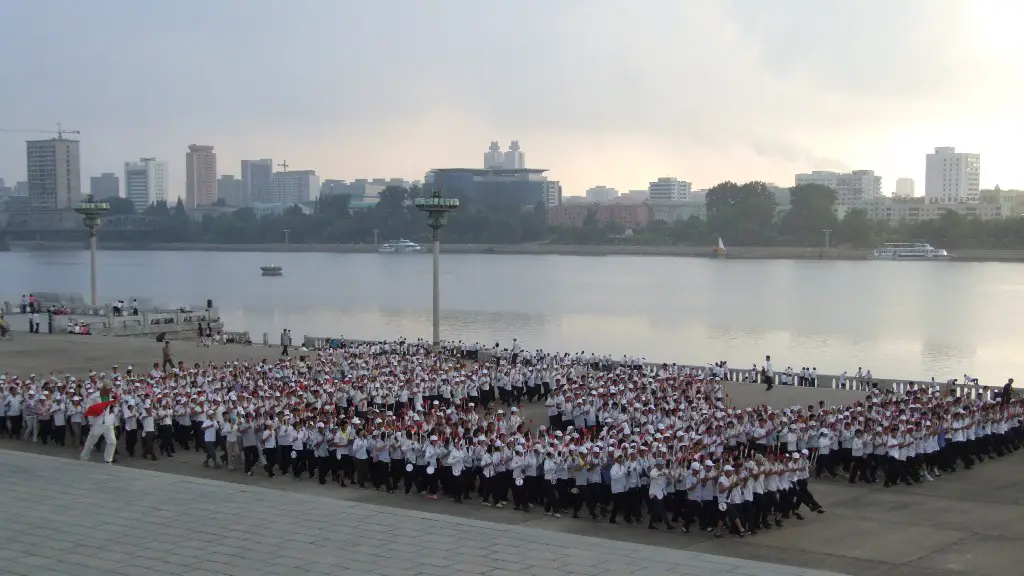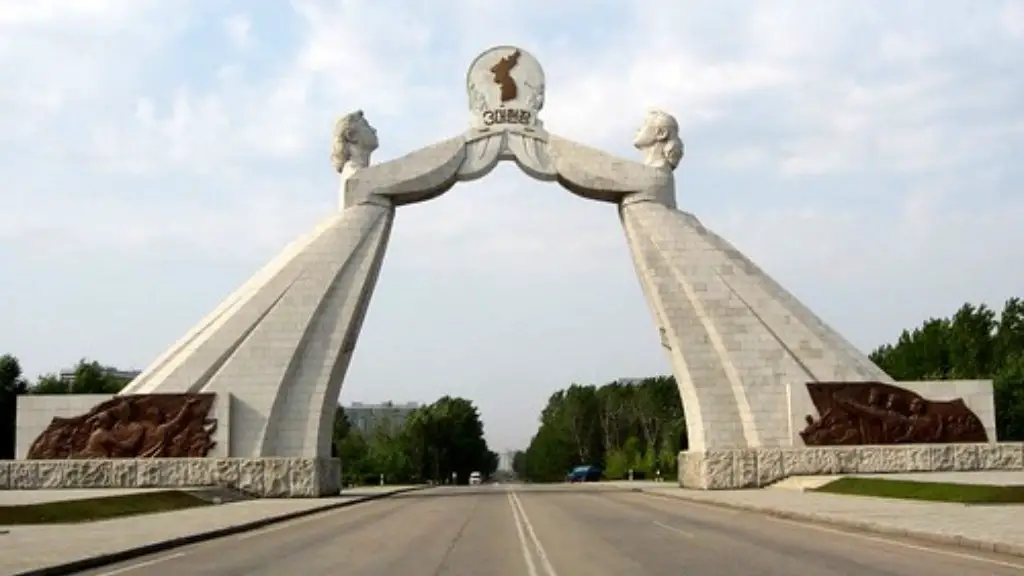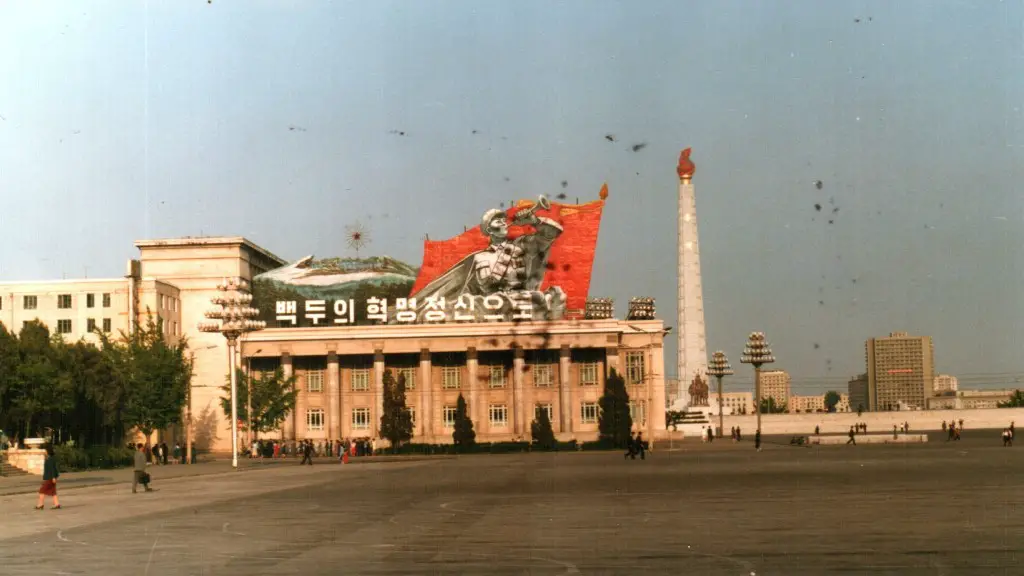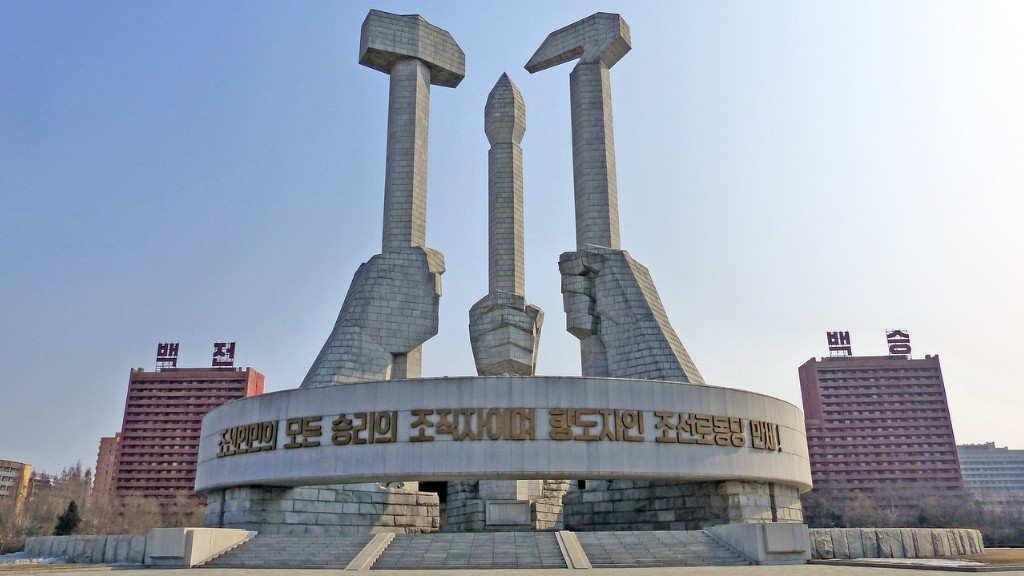North Korea is an isolated, authoritarian state which has been ruled by the Kim dynasty since the northern half of the Korean peninsula was divided in 1945. Polical and economic life in the country is heavily controlled by the government, which is known as the Workers Party of Korea and is headed by supreme leader Kim Jong Un. The main governing body of North Korea is the Supreme People’s Assembly, the country’s highest legislative body. It is composed of members who are elected every five years.
North Korea’s constitution stipulates that the country is a single-party, socialist state. This means that all political power is held by the Workers Party of Korea, which is politically and economically dominant. All government offices, as well as all members of the party, are elected by the Supreme People’s Assembly. All major policies, both economic and political, are decided by the party. The government also implements internal security services, which monitor citizens, particularly those deemed politically unreliable by the party leadership.
The present Supreme Leader, Kim Jong Un, is the sole holder of absolute power and is responsible for the day-to-day running of all affairs of the state. He is appointed by the National Defence Commission and is assisted by the Presidency, which is a group of the nation’s highest-ranking politicians. The Prime Minister is the second most powerful individual, who is responsible for managing practical day-to-day matters, such as the implementation of policy. All major decisions are still made by the party, which can override any actions taken by the Prime Minister.
The legal system in North Korea is heavily influenced by Marxist-Leninism, as well as by traditional Korean customs. The main judicial body is the Supreme Court, which is appointed by the party and is responsible for the interpretation and implementation of the law. The court’s decisions are not subject to appeal and are considered final.
Overall, North Korea is an authoritarian and totalitarian nation, whose population is kept in relative isolation from the rest of the world and under constant state surveillance. The ruling Workers Party of Korea holds complete control over the country and its citizens, and dissent is not tolerated. While the country underwent economic reform in the early 2000s under Kim Jong Il, economic growth has stagnated and the economy remains reliant on imports from China and Russia.
Civil Rights
The citizens of North Korea have limited civil and political rights, as the country’s constitution stipulates that all power is held by the Workers’ Party of Korea. Freedom of speech is tightly controlled, as is freedom of assembly. Unauthorized demonstrations are not allowed, and citizens cannot criticize the government or the supreme leader. Personal security is heavily monitored by the government, and people are discouraged from fleeing abroad, with those attempting to do so subject to harsh penalties.
Travelling abroad is also strictly controlled, with the government discouraging citizens from leaving the country without permission. Foreign media is banned, including newspapers, television shows and the internet. People suspected of having connections with the outside world or of voicing criticism against the government are subjected to imprisonment and re-education.
Media
North Korea has a heavily censored media and tightly controlled access to international outlets. All newspapers, radio and television programs are owned and operated by the government, which devotes most of its coverage to praising the supreme leader, promoting the party line and slogans, and giving updates on the progress of the country’s economy. Foreign media outlets, including the internet, are blocked or banned.
In recent years, mobile internet access has become more accessible for people in the capital. North Koreans can use the internet to access educational resources in the form of podcasts, video lessons and web content, however, access is heavily censored and anyone found accessing foreign sites or discussing political topics is subject to imprisonment or re-education.
Social Life
North Koreans are expected to abide by a strict moral code that is enforced and promoted by the government. There is a focus on self- discipline and a respect for authority. Most social activities are centered around the official holidays, concerts and festivals organized by the government. Most leisure activities, with the exception of sports, are funded and organized by the government, including music and drama.
The workforce in North Korea is regimented and largely employed in industry, with construction, mining and manufacturing concentrated in the north-eastern part of the country. The economy is largely centrally planned and is heavily dependent on foreign aid, primarily from China and Russia.
Foreign Relations
North Korea’s foreign policy is characterized by a combination of suspicion, hostility and isolationism towards the outside world. The country has only a handful of diplomatic relations, most of which are with Communist and non-aligned nations. North Korea is particularly hostile towards the United States and is technically still at war with South Korea.
Recent attempts to open up diplomatic ties with the United States have faltered, and relations remain strained. North Korea is continuing to expand its nuclear and missile programs, defying United Nations Security Council Resolutions and provoking concern from the international community.
Economy
The economy of North Korea is largely an extension of its political system and is dominated by the Workers’ Party of Korea. It is a centrally planned economy, where the majority of productive resources are owned and managed by the state. Agriculture is the primary industry, with the majority of agricultural products sold domestically. Private businesses are tolerated, but are heavily regulated and taxed by the government.
The economy of North Korea is heavily reliant on foreign aid, with China, its main donor. Other donor countries include South Korea and Russia, who provide aid in the form of food, fuel and other resources. North Korea also participates in joint venture projects with China and Russia, which are mainly engaged in the extraction of natural resources such as gold, coal, tin and zinc.
In recent years, North Korea has made attempts to liberalise its economy and introduce market reforms, however, these attempts have largely failed and the economy remains largely dependent on foreign aid and highly centralized.
Education
Education in North Korea is highly centralized, with the government dominating the educational system. The government places a strong emphasis on ideological indoctrination and promotes patriotism towards the ruling Kim dynasty. All students attend compulsory classes in Juche, the state’s ideological foundation, which is taught in place of international history and other political philosophies.
The country’s universities are reserved for the elite, however, the majority of the population is illiterate and lacks access to higher education. University students are students of the party and have to attend political training sessions in order to remain enrolled. Education is free up to a certain level, however, educational resources are scarce and the quality of teaching is low.
Healthcare
Healthcare in North Korea is delivered via a centralized, state-run system. The majority of medical resources, including drugs and equipment, are provided by the government. However, medical supplies are limited and access is restricted to the elites, with the majority of the population lacking access to basic health care. The country also lacks medical professionals, and medical care is often provided by untrained personnel.
The country’s health care system is hampered by a lack of funding, a lack of medical knowledge, and the general lack of resources. The country has high rates of infant and maternal mortality, and infectious diseases, such as tuberculosis and malaria, are a major concern. The country also suffers from a lack of nutrition, with the majority of people living on a diet of corn and rice. Poor sanitation, overcrowding and the lack of access to clean drinking water are also major problems.





